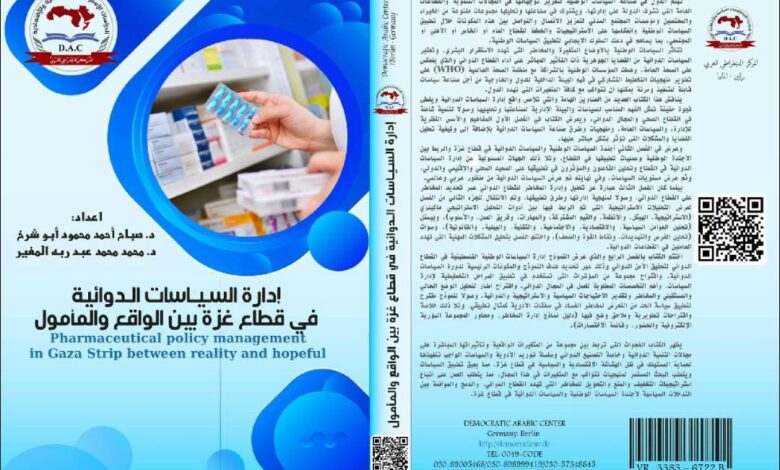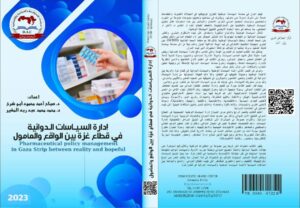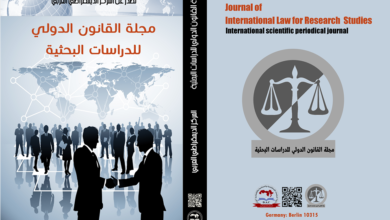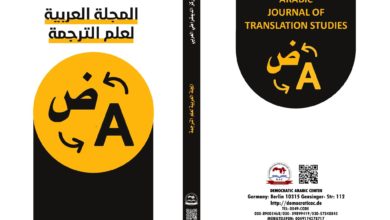إدارة السـيـاسات الـدوائية في قطاع غزة بين الواقع والمأمول
Pharmaceutical Policy Management in Gaza Strip Between Reality and Hopeful

تأليف : –
- د. صباح أحمد محمود أبو شرخ – دكتوراه إدارة صحية من جامعة البطانة في السودان – باحثة في مجال إدارة المخاطر والإدارة الصحية
- د. محمد محمد عبد ربه المغير – دكتوراه هندسة التخطيط العمراني – جامعة الأزهر – مصر – استاذ مساعد في التخطيط وإدارة المخاطر بالجامعات الفلسطينية
نسخة “pdf”-
إدارة السـيـاسات الـدوائية في قطاع غزة بين الواقع والمأمول
الطبعة الأولى “2023″ –من كتاب: – إدارة السـيـاسات الـدوائية في قطاع غزة بين الواقع والمأمول
جميع حقوق الطبع محفوظة #المركز_الديمقراطي_العربي ولا يسمح بإعادة إصدار هذا الكتاب أو اي جزء منه أو تخزينه في نطاق إستعادة المعلومات أو نقله بأي شكل من الأشكال، دون إذن مسبق خطي من الناشر .
تقديم :
تهتم الدول في صناعة السياسات الوطنية لتعزيز توجهاتها في المجالات التنموية والقطاعات العامة التى تشرف الدولة على إدارتها، ويشترك في صناعتها وتحليلها مجموعات متنوعة من الخبراء والمختصين ومؤسسات المجتمع المدني لتعزيز الاتصال والتواصل بين هذه المكونات خلال تطبيق السياسات الوطنية وانعكاسها على الاستراتيجيات والخطط للقطاع العام أو الخاص أو الأهلي أو المجتمعي، بما يساهم في دعك السلوك الايجابي لتطبيق السياسات الوطنية.
تتأثر السياسات الوطنية بالأوضاع المتغيرة والمخاطر التى تهدد الاستقرار البشري، وتعتبر السياسات الدوائية من القضايا الجوهرية ذات التأثير المباشر على أداء القطاع الدوائي والذي ينعكس على الصحة العامة، وعملت المؤسسات الوطنية بالشراكة مع منظمة الصحة العالمية (WHO) على تطوير منهجيات التخطيط التشاركي في فهم البيئة الداخلية للدول والخارجية من أجل صناعة سياسات قابلة للتنفيذ ومرنة يمكنها أن تتواكب مع كافة المتغيرات التى تهدد الدول.
يناقش هذا الكتاب العديد من العناوين الهامة والتي تلامس واقع إدارة السياسات الدوائية ويغطى فجوة حقيقة تمثل الفهم المناسب للسياسات والبيئة الإدارية لصناعتها وتحليليها وصولًا لتنمية شاملة في القطاع الصحي والمجال الدوائي، ويعرض الكتاب في الفصل الأول المفاهيم والأسس النظرية للإدارة، والسياسات العامة، ومنهجيات وطرق صناعة السياسات الدوائية بالإضافة إلى وكيفية تحليل القضايا والمشكلات التى تؤثر بشكل مباشر عليها.
وعرض في الفصل الثاني أجندة السياسات الوطنية والسياسات الدوائية في قطاع غزة والربط بين الأجندة الوطنية وعمليات تطبيقها في القطاع، وتلا ذلك الجهات المسئولية عن إدارة السياسات الدوائية في القطاع وتحليل الفاعلون والمؤثرون في تطبيقها على الصعيد المحلي والإقليمي والدولي، وثم عرض مستويات السياسات، وفي نهايته تم عرض السياسات الدوائية من منظور عربي وعالمي.
بينما كان الفصل الثالث عبارة عن تحليل وإدارة المخاطر للقطاع الدوائي عبر تحديد المخاطر على القطاع الدوائي، وصولًا لمنهجية إدارتها وطرق تطبيقها، وتم الانتقال للجزء الثاني من الفصل لعرض التحليلات الاستراتيجية التى تم الربط فيها بين أدوات التحليل الاستراتيجي ماكينزي (الاستراتيجية، الهيكل، والأنظمة، والقيم المشتركة، والمهارات، وفريق العمل، والأسلوب)، وبيستل (تحليل العوامل السياسية، والاقتصادية، والاجتماعية، والتقنية، والبيئية، والقانونية)، وسوات (تحليل الفرص والتهديدات، ونقاط القوة والضعف)، واختتم الفصل بتحليل المشكلات المهنية التى تهدد العاملين في القطاعات الدوائية.
اختتم الكتاب بالفصل الرابع والذي عرض النموذج إدارة السياسات الوطنية الفلسطينية في القطاع الدوائي لتحقيق الأمن الدوائي وذلك عبر تحديد هدف النموذج والمكونات الرئيسية لدورة السياسات الدوائية، واقتراح مجموعة من المؤشرات التى تستخدم في تطبيق المراحل التخطيطية لإدارة السياسات، وأهم التخصصات المطلوبة للعمل في المجال الدوائي، واقتراح اطار لتحليل الوضع الحالي والمستقبلي والمخاطر وتقدير الاحتياجات السياسية والاستراتيجية والدوائية، وصولًا لنموذج مقترح لتطبيق سياسة الحد من التعرض لمخاطر الفساد في صفقات الأدوية كمثال تطبيقي، وتلا ذلك خلاصة واقتراحات تطويرية وملاحق وضع فيها (دليل نماذج إدارة المخاطر، ومحاور المجموعة البؤرية الإلكترونية والحضور، وقائمة الاختصارات).
يظهر الكتاب الفجوات التى تربط بين مجموعة من المتغيرات الواقعية وتأثيراتها المباشرة على مجالات التنمية الدوائية وخاصة التصنيع الدوائي وسلسلة توريد الأدوية والسياسات الواجب تنفيذها لحماية المستهلك في ظل الهشاشة الاقتصادية والسياسية في قطاع غزة، مما يعيق تطبيق السياسات ويتطلب البحث المستمر لمنهجيات تتواكب مع المتغيرات في هذا المجال، مما يتطلب العمل على اتباع استراتيجيات التخفيف والمنع والتحويل للمخاطر التي تهدد القطاع الدوائي، والدمج والموائمة بين التدخلات السياسية لأجندة السياسات الوطنية والسياسات الدوائية في قطاع غزة.
Dr. Sabah A. M. Abu Sharekh – PhD in Health management from Al-Butana University in Sudan – Researcher in the field of risk management and health management
Dr. Mohammed M. A. R. El Mougher – Ph.D. Urban Planning Engineering – Al-Azhar University, Egypt. – Assistant Pro. of Planning and Risk Management in Palestinian
Abstract
Countries are interested in national policy-making to strengthen their orientations in the development fields and the public sectors that are under the state’s administration. Policy-making and analysis involve a variety of experts, specialists, and civil society institutions to enhance communication among this components during application of national policies and their reflection on strategies and plans, for public, private, civil, or community, to promote and support positive behavior toward the implementation of national policies.
National policies are influenced by changing situations and risks threatening human stability. Pharmaceutical policies are one of the critical issues that directly impact the pharmaceutical sector’s performance, which reflects on public health. National institutions have partnered with the World Health Organization (WHO) to develop participatory planning methodologies in understanding the internal and external environment to create enforceable and flexible policies that can keep up with all variables that threats to countries.
This book discusses several important topics that touch on the reality of drug policy management. It covers a real gap that represents a proper understanding of the policies and the administrative environment for policy-making and analysis to achieve comprehensive development in the health and pharmaceutical sectors. In chapter I, from the book shows the concepts and theoretical foundations of management public policies, and methodological making of pharmaceutical policies, also how analyze issues and problems that directly affect them.
Chapter II presents the national policy agenda and pharmaceutical policies in the Gaza Strip and links the national agenda with its implementation processes in the Strip. Then it handles the entities responsible for managing the pharmaceutical policies in the Strip and the analysis of the actors and influencers in their implementation at the local, regional and international levels, and then presents the policy levels. Finally, the chapter ends with a review of pharmaceutical policies from an Arab and global faces.
While in chapter, III consists of risk analysis and management of the pharmaceutical sector by identifying risks on pharmaceutical sector. It also included the management & steps for its applications, part II of the chapter presented strategic analysis linking McKinsey’s strategic analysis tools (Strategy, Structure, Systems, Shared Values, Skills, Task Force, Style), PESTEL (Analysis of political, economic, social, technical, environmental and legal factors) and SWOT (analysis of opportunities and threats, strengths, and weaknesses). Then the chapter concluded by analyzing the occupational problems that threaten the workers in the pharmaceutical sector.
The last chapter of the book (chapter IV) presents the Palestinian national policy management model in the pharmaceutical sector to achieve drug security by defining the model’s objective and key components of the pharmaceutical policy cycle and proposes a set of indicators to be used in the application of the planning stages of policy management; and outlined the most crucial disciplines needed for employment in the pharmaceutical field. This chapter proposes a framework for analyzing the current and future situation and risks; and assessing the political, strategic, and pharmaceutical needs. Finally, the chapter suggests a model for implementing the policy of reducing exposure to corruption in drug transactions as an applied example, followed by a compendium, development suggestions, and annexes (Risk Management Model Manual, Electronic Focus Group Axes, Attendance & Shortcuts List).
The book demonstrates the gaps that connect a variety of realistic variables and their direct impact on the areas of pharmaceutical development, particularly pharmaceutical manufacturing, drug supply chain, and the policies to be implemented to protect consumers in light of the Gaza Strip’s political and economic vulnerability. These vulnerabilities impede the implementation of policies and require a constant search for methodologies that correspond to the changing variables in this area. Hence, it is necessary to follow strategies that mitigate, prevent, and convert the risks that threaten the pharmaceutical sector. It also necessitates integrating and harmonizing the political interventions of the national and pharmaceutical policy agenda in the Gaza Strip.
- الناشر: المركز الديمقراطي العربي للدراسات الإستراتيجية والسياسية والاقتصادية





